Organisational Culture and Development Report: BBHM302, Semester 1
VerifiedAdded on 2022/08/17
|12
|2422
|19
Report
AI Summary
This report delves into the multifaceted concept of organisational culture within the hospitality sector, addressing its significance in shaping employee behavior, productivity, and overall organisational development. It begins by defining organisational culture and exploring its key dimensions, including symbolic reminders, keystone behaviors, and mindsets. The report then examines the influences and determinants of organisational culture, such as local traditions, service orientation, innovation, and shared responsibility, emphasizing the importance of employee commitment and shared values. A case study of Sofitel Melbourne on Collins is used to illustrate these concepts, analyzing the hotel's organisational culture through the lens of its service culture, innovation, and total quality management. The report concludes by highlighting the critical role of organisational culture as a source of competitive advantage, and by reflecting on the practical application of these concepts.
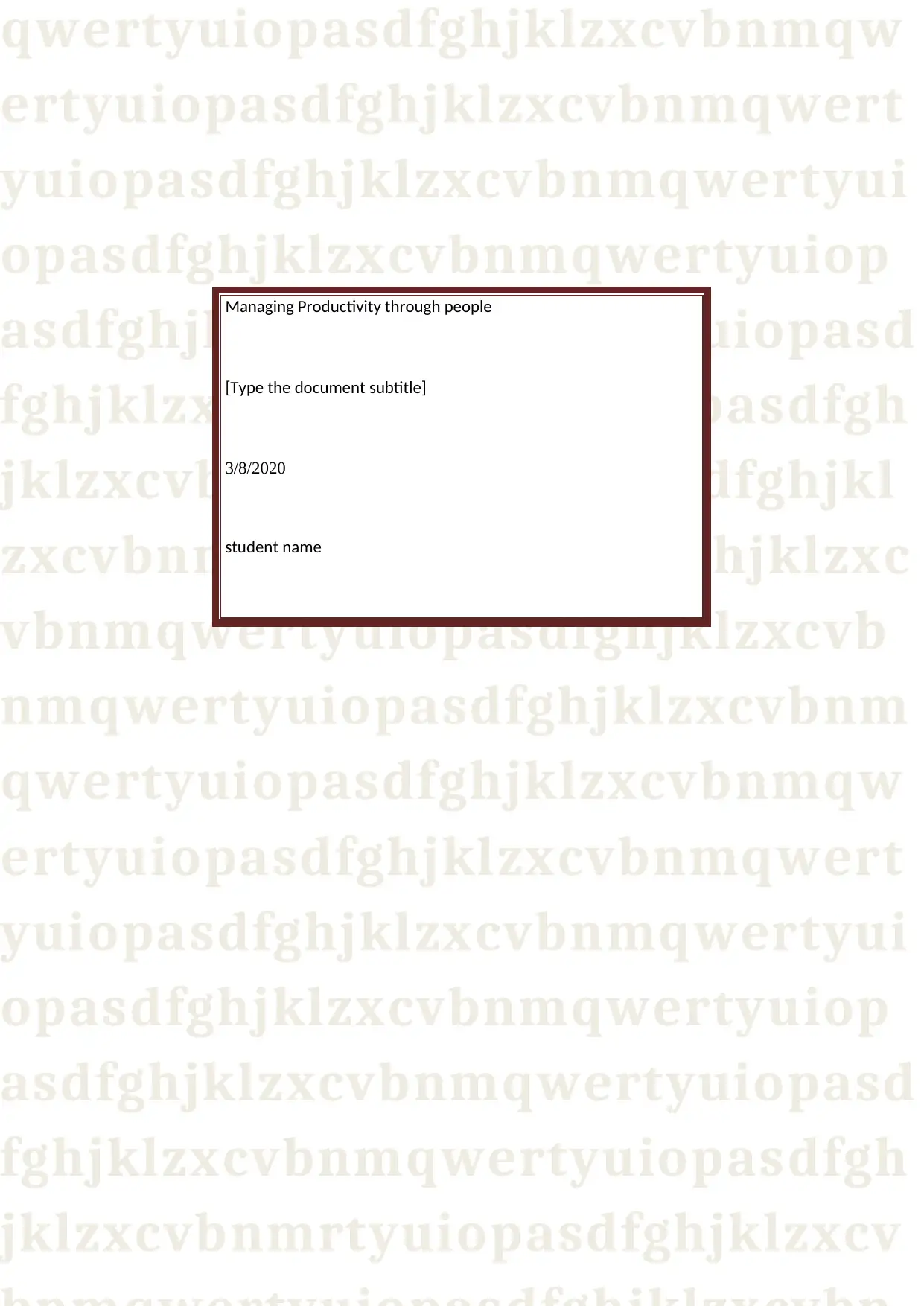
qwertyuiopasdfghjklzxcvbnmqw
ertyuiopasdfghjklzxcvbnmqwert
yuiopasdfghjklzxcvbnmqwertyui
opasdfghjklzxcvbnmqwertyuiop
asdfghjklzxcvbnmqwertyuiopasd
fghjklzxcvbnmqwertyuiopasdfgh
jklzxcvbnmqwertyuiopasdfghjkl
zxcvbnmqwertyuiopasdfghjklzxc
vbnmqwertyuiopasdfghjklzxcvb
nmqwertyuiopasdfghjklzxcvbnm
qwertyuiopasdfghjklzxcvbnmqw
ertyuiopasdfghjklzxcvbnmqwert
yuiopasdfghjklzxcvbnmqwertyui
opasdfghjklzxcvbnmqwertyuiop
asdfghjklzxcvbnmqwertyuiopasd
fghjklzxcvbnmqwertyuiopasdfgh
jklzxcvbnmrtyuiopasdfghjklzxcv
Managing Productivity through people
[Type the document subtitle]
3/8/2020
student name
ertyuiopasdfghjklzxcvbnmqwert
yuiopasdfghjklzxcvbnmqwertyui
opasdfghjklzxcvbnmqwertyuiop
asdfghjklzxcvbnmqwertyuiopasd
fghjklzxcvbnmqwertyuiopasdfgh
jklzxcvbnmqwertyuiopasdfghjkl
zxcvbnmqwertyuiopasdfghjklzxc
vbnmqwertyuiopasdfghjklzxcvb
nmqwertyuiopasdfghjklzxcvbnm
qwertyuiopasdfghjklzxcvbnmqw
ertyuiopasdfghjklzxcvbnmqwert
yuiopasdfghjklzxcvbnmqwertyui
opasdfghjklzxcvbnmqwertyuiop
asdfghjklzxcvbnmqwertyuiopasd
fghjklzxcvbnmqwertyuiopasdfgh
jklzxcvbnmrtyuiopasdfghjklzxcv
Managing Productivity through people
[Type the document subtitle]
3/8/2020
student name
Paraphrase This Document
Need a fresh take? Get an instant paraphrase of this document with our AI Paraphraser
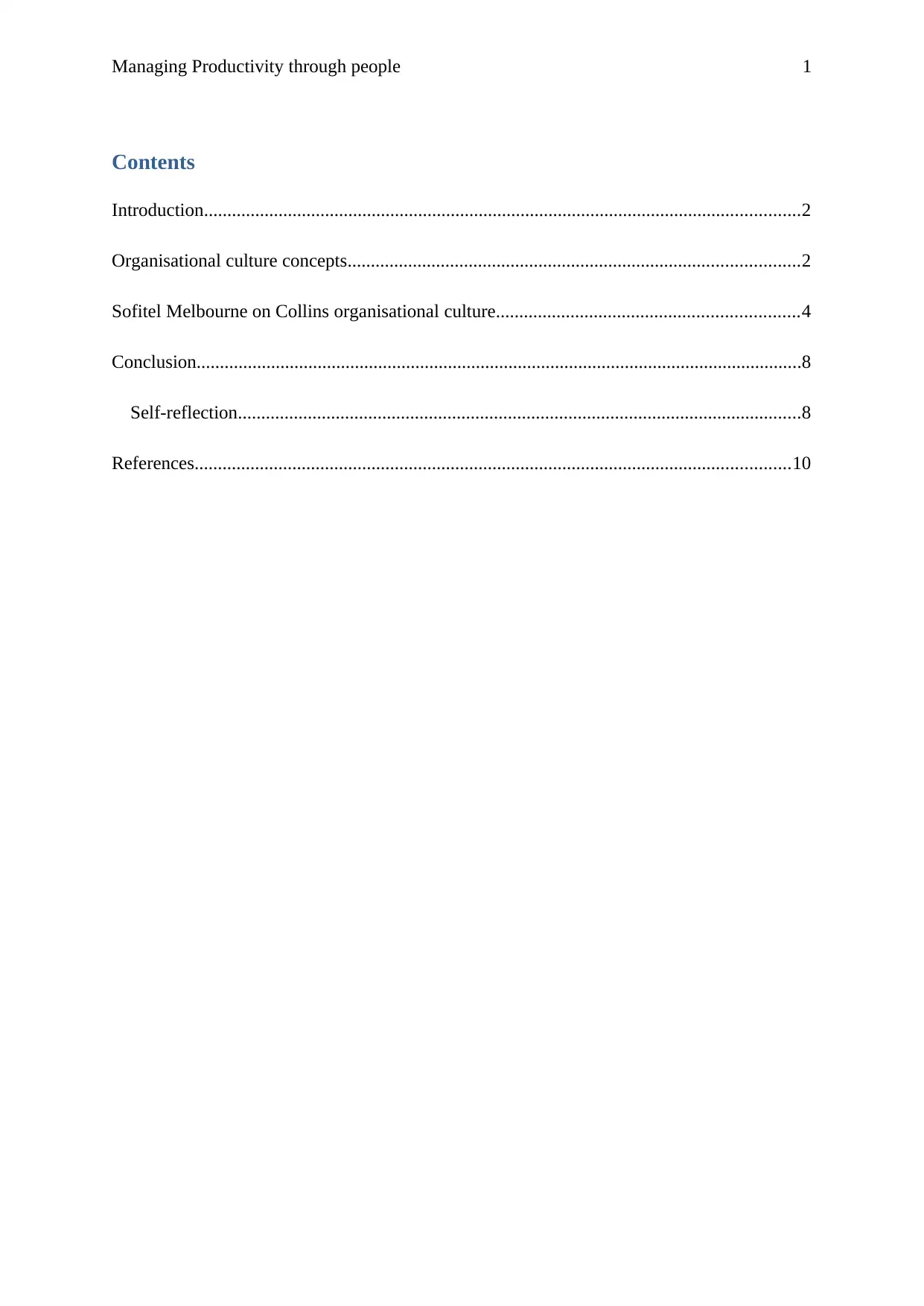
Managing Productivity through people 1
Contents
Introduction................................................................................................................................2
Organisational culture concepts.................................................................................................2
Sofitel Melbourne on Collins organisational culture.................................................................4
Conclusion..................................................................................................................................8
Self-reflection.........................................................................................................................8
References................................................................................................................................10
Contents
Introduction................................................................................................................................2
Organisational culture concepts.................................................................................................2
Sofitel Melbourne on Collins organisational culture.................................................................4
Conclusion..................................................................................................................................8
Self-reflection.........................................................................................................................8
References................................................................................................................................10
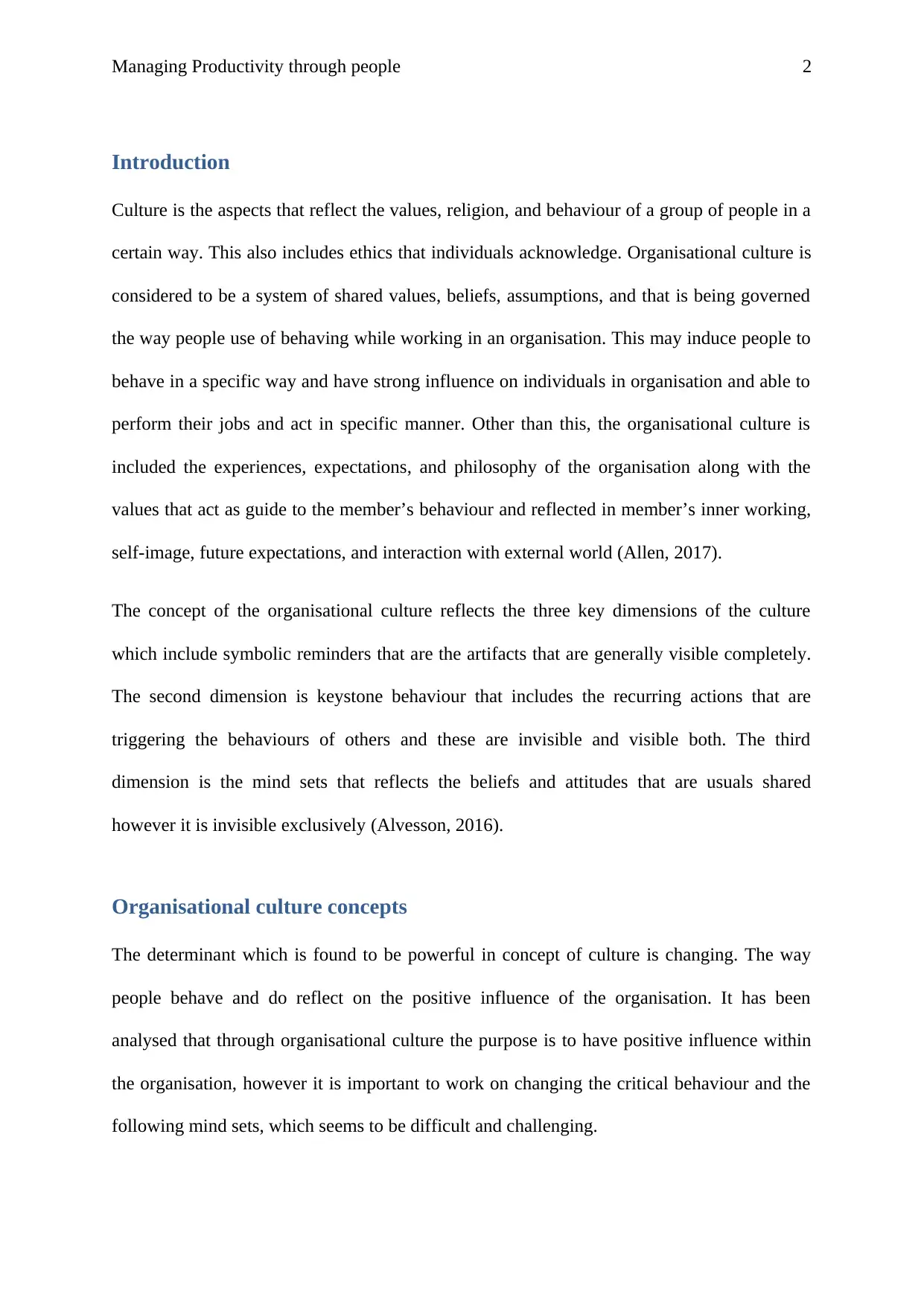
Managing Productivity through people 2
Introduction
Culture is the aspects that reflect the values, religion, and behaviour of a group of people in a
certain way. This also includes ethics that individuals acknowledge. Organisational culture is
considered to be a system of shared values, beliefs, assumptions, and that is being governed
the way people use of behaving while working in an organisation. This may induce people to
behave in a specific way and have strong influence on individuals in organisation and able to
perform their jobs and act in specific manner. Other than this, the organisational culture is
included the experiences, expectations, and philosophy of the organisation along with the
values that act as guide to the member’s behaviour and reflected in member’s inner working,
self-image, future expectations, and interaction with external world (Allen, 2017).
The concept of the organisational culture reflects the three key dimensions of the culture
which include symbolic reminders that are the artifacts that are generally visible completely.
The second dimension is keystone behaviour that includes the recurring actions that are
triggering the behaviours of others and these are invisible and visible both. The third
dimension is the mind sets that reflects the beliefs and attitudes that are usuals shared
however it is invisible exclusively (Alvesson, 2016).
Organisational culture concepts
The determinant which is found to be powerful in concept of culture is changing. The way
people behave and do reflect on the positive influence of the organisation. It has been
analysed that through organisational culture the purpose is to have positive influence within
the organisation, however it is important to work on changing the critical behaviour and the
following mind sets, which seems to be difficult and challenging.
Introduction
Culture is the aspects that reflect the values, religion, and behaviour of a group of people in a
certain way. This also includes ethics that individuals acknowledge. Organisational culture is
considered to be a system of shared values, beliefs, assumptions, and that is being governed
the way people use of behaving while working in an organisation. This may induce people to
behave in a specific way and have strong influence on individuals in organisation and able to
perform their jobs and act in specific manner. Other than this, the organisational culture is
included the experiences, expectations, and philosophy of the organisation along with the
values that act as guide to the member’s behaviour and reflected in member’s inner working,
self-image, future expectations, and interaction with external world (Allen, 2017).
The concept of the organisational culture reflects the three key dimensions of the culture
which include symbolic reminders that are the artifacts that are generally visible completely.
The second dimension is keystone behaviour that includes the recurring actions that are
triggering the behaviours of others and these are invisible and visible both. The third
dimension is the mind sets that reflects the beliefs and attitudes that are usuals shared
however it is invisible exclusively (Alvesson, 2016).
Organisational culture concepts
The determinant which is found to be powerful in concept of culture is changing. The way
people behave and do reflect on the positive influence of the organisation. It has been
analysed that through organisational culture the purpose is to have positive influence within
the organisation, however it is important to work on changing the critical behaviour and the
following mind sets, which seems to be difficult and challenging.
⊘ This is a preview!⊘
Do you want full access?
Subscribe today to unlock all pages.

Trusted by 1+ million students worldwide
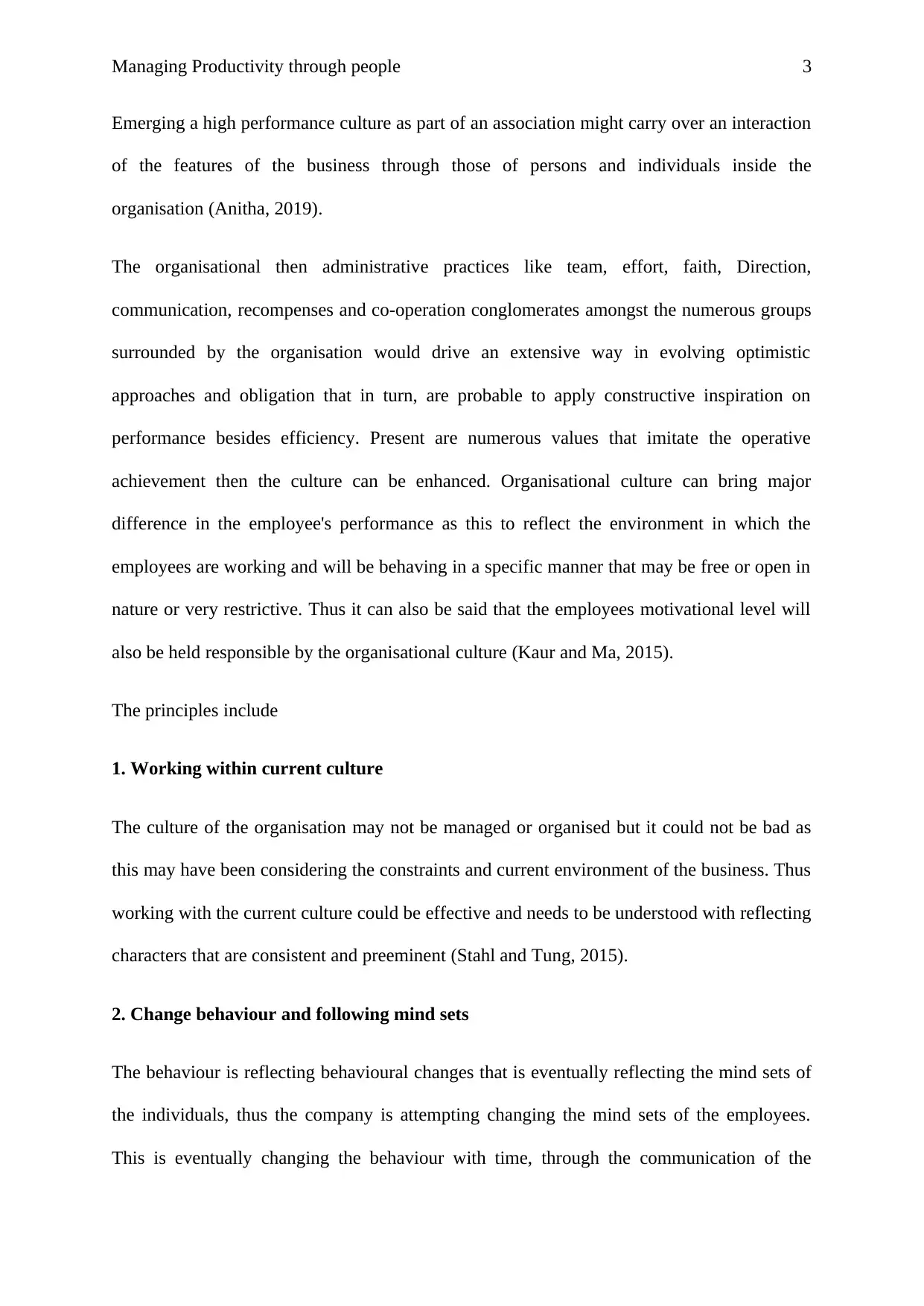
Managing Productivity through people 3
Emerging a high performance culture as part of an association might carry over an interaction
of the features of the business through those of persons and individuals inside the
organisation (Anitha, 2019).
The organisational then administrative practices like team, effort, faith, Direction,
communication, recompenses and co-operation conglomerates amongst the numerous groups
surrounded by the organisation would drive an extensive way in evolving optimistic
approaches and obligation that in turn, are probable to apply constructive inspiration on
performance besides efficiency. Present are numerous values that imitate the operative
achievement then the culture can be enhanced. Organisational culture can bring major
difference in the employee's performance as this to reflect the environment in which the
employees are working and will be behaving in a specific manner that may be free or open in
nature or very restrictive. Thus it can also be said that the employees motivational level will
also be held responsible by the organisational culture (Kaur and Ma, 2015).
The principles include
1. Working within current culture
The culture of the organisation may not be managed or organised but it could not be bad as
this may have been considering the constraints and current environment of the business. Thus
working with the current culture could be effective and needs to be understood with reflecting
characters that are consistent and preeminent (Stahl and Tung, 2015).
2. Change behaviour and following mind sets
The behaviour is reflecting behavioural changes that is eventually reflecting the mind sets of
the individuals, thus the company is attempting changing the mind sets of the employees.
This is eventually changing the behaviour with time, through the communication of the
Emerging a high performance culture as part of an association might carry over an interaction
of the features of the business through those of persons and individuals inside the
organisation (Anitha, 2019).
The organisational then administrative practices like team, effort, faith, Direction,
communication, recompenses and co-operation conglomerates amongst the numerous groups
surrounded by the organisation would drive an extensive way in evolving optimistic
approaches and obligation that in turn, are probable to apply constructive inspiration on
performance besides efficiency. Present are numerous values that imitate the operative
achievement then the culture can be enhanced. Organisational culture can bring major
difference in the employee's performance as this to reflect the environment in which the
employees are working and will be behaving in a specific manner that may be free or open in
nature or very restrictive. Thus it can also be said that the employees motivational level will
also be held responsible by the organisational culture (Kaur and Ma, 2015).
The principles include
1. Working within current culture
The culture of the organisation may not be managed or organised but it could not be bad as
this may have been considering the constraints and current environment of the business. Thus
working with the current culture could be effective and needs to be understood with reflecting
characters that are consistent and preeminent (Stahl and Tung, 2015).
2. Change behaviour and following mind sets
The behaviour is reflecting behavioural changes that is eventually reflecting the mind sets of
the individuals, thus the company is attempting changing the mind sets of the employees.
This is eventually changing the behaviour with time, through the communication of the
Paraphrase This Document
Need a fresh take? Get an instant paraphrase of this document with our AI Paraphraser
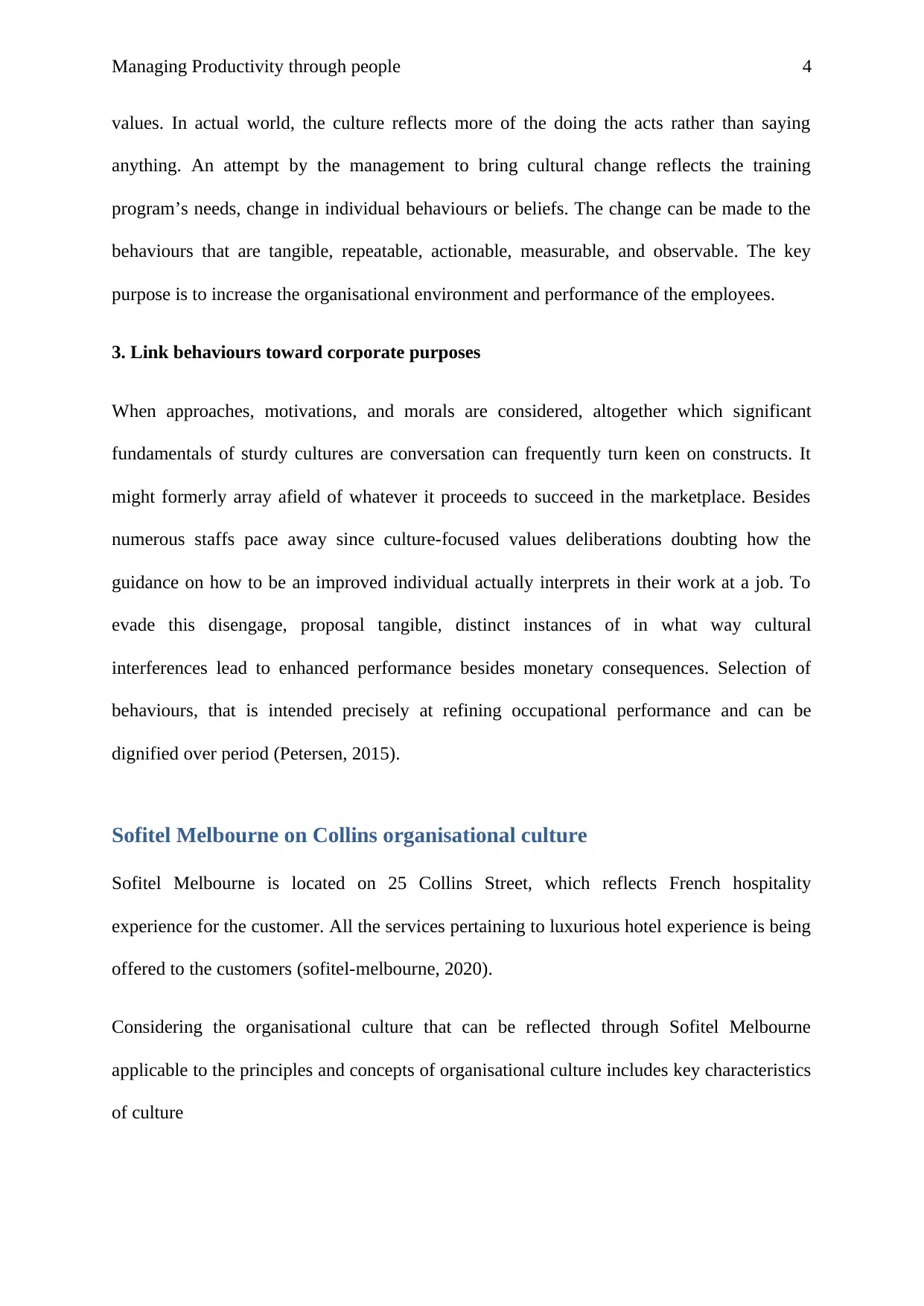
Managing Productivity through people 4
values. In actual world, the culture reflects more of the doing the acts rather than saying
anything. An attempt by the management to bring cultural change reflects the training
program’s needs, change in individual behaviours or beliefs. The change can be made to the
behaviours that are tangible, repeatable, actionable, measurable, and observable. The key
purpose is to increase the organisational environment and performance of the employees.
3. Link behaviours toward corporate purposes
When approaches, motivations, and morals are considered, altogether which significant
fundamentals of sturdy cultures are conversation can frequently turn keen on constructs. It
might formerly array afield of whatever it proceeds to succeed in the marketplace. Besides
numerous staffs pace away since culture-focused values deliberations doubting how the
guidance on how to be an improved individual actually interprets in their work at a job. To
evade this disengage, proposal tangible, distinct instances of in what way cultural
interferences lead to enhanced performance besides monetary consequences. Selection of
behaviours, that is intended precisely at refining occupational performance and can be
dignified over period (Petersen, 2015).
Sofitel Melbourne on Collins organisational culture
Sofitel Melbourne is located on 25 Collins Street, which reflects French hospitality
experience for the customer. All the services pertaining to luxurious hotel experience is being
offered to the customers (sofitel-melbourne, 2020).
Considering the organisational culture that can be reflected through Sofitel Melbourne
applicable to the principles and concepts of organisational culture includes key characteristics
of culture
values. In actual world, the culture reflects more of the doing the acts rather than saying
anything. An attempt by the management to bring cultural change reflects the training
program’s needs, change in individual behaviours or beliefs. The change can be made to the
behaviours that are tangible, repeatable, actionable, measurable, and observable. The key
purpose is to increase the organisational environment and performance of the employees.
3. Link behaviours toward corporate purposes
When approaches, motivations, and morals are considered, altogether which significant
fundamentals of sturdy cultures are conversation can frequently turn keen on constructs. It
might formerly array afield of whatever it proceeds to succeed in the marketplace. Besides
numerous staffs pace away since culture-focused values deliberations doubting how the
guidance on how to be an improved individual actually interprets in their work at a job. To
evade this disengage, proposal tangible, distinct instances of in what way cultural
interferences lead to enhanced performance besides monetary consequences. Selection of
behaviours, that is intended precisely at refining occupational performance and can be
dignified over period (Petersen, 2015).
Sofitel Melbourne on Collins organisational culture
Sofitel Melbourne is located on 25 Collins Street, which reflects French hospitality
experience for the customer. All the services pertaining to luxurious hotel experience is being
offered to the customers (sofitel-melbourne, 2020).
Considering the organisational culture that can be reflected through Sofitel Melbourne
applicable to the principles and concepts of organisational culture includes key characteristics
of culture
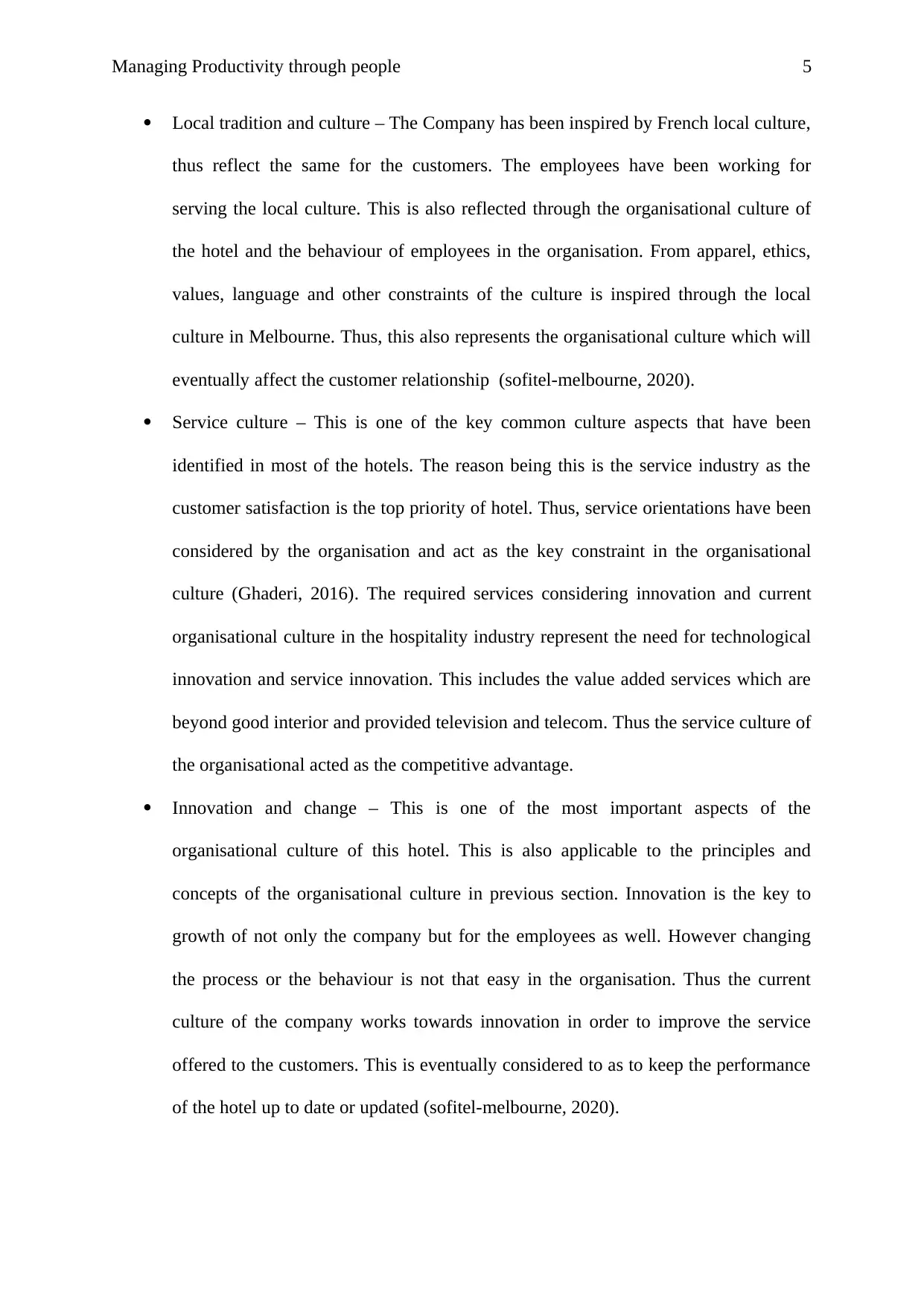
Managing Productivity through people 5
Local tradition and culture – The Company has been inspired by French local culture,
thus reflect the same for the customers. The employees have been working for
serving the local culture. This is also reflected through the organisational culture of
the hotel and the behaviour of employees in the organisation. From apparel, ethics,
values, language and other constraints of the culture is inspired through the local
culture in Melbourne. Thus, this also represents the organisational culture which will
eventually affect the customer relationship (sofitel-melbourne, 2020).
Service culture – This is one of the key common culture aspects that have been
identified in most of the hotels. The reason being this is the service industry as the
customer satisfaction is the top priority of hotel. Thus, service orientations have been
considered by the organisation and act as the key constraint in the organisational
culture (Ghaderi, 2016). The required services considering innovation and current
organisational culture in the hospitality industry represent the need for technological
innovation and service innovation. This includes the value added services which are
beyond good interior and provided television and telecom. Thus the service culture of
the organisational acted as the competitive advantage.
Innovation and change – This is one of the most important aspects of the
organisational culture of this hotel. This is also applicable to the principles and
concepts of the organisational culture in previous section. Innovation is the key to
growth of not only the company but for the employees as well. However changing
the process or the behaviour is not that easy in the organisation. Thus the current
culture of the company works towards innovation in order to improve the service
offered to the customers. This is eventually considered to as to keep the performance
of the hotel up to date or updated (sofitel-melbourne, 2020).
Local tradition and culture – The Company has been inspired by French local culture,
thus reflect the same for the customers. The employees have been working for
serving the local culture. This is also reflected through the organisational culture of
the hotel and the behaviour of employees in the organisation. From apparel, ethics,
values, language and other constraints of the culture is inspired through the local
culture in Melbourne. Thus, this also represents the organisational culture which will
eventually affect the customer relationship (sofitel-melbourne, 2020).
Service culture – This is one of the key common culture aspects that have been
identified in most of the hotels. The reason being this is the service industry as the
customer satisfaction is the top priority of hotel. Thus, service orientations have been
considered by the organisation and act as the key constraint in the organisational
culture (Ghaderi, 2016). The required services considering innovation and current
organisational culture in the hospitality industry represent the need for technological
innovation and service innovation. This includes the value added services which are
beyond good interior and provided television and telecom. Thus the service culture of
the organisational acted as the competitive advantage.
Innovation and change – This is one of the most important aspects of the
organisational culture of this hotel. This is also applicable to the principles and
concepts of the organisational culture in previous section. Innovation is the key to
growth of not only the company but for the employees as well. However changing
the process or the behaviour is not that easy in the organisation. Thus the current
culture of the company works towards innovation in order to improve the service
offered to the customers. This is eventually considered to as to keep the performance
of the hotel up to date or updated (sofitel-melbourne, 2020).
⊘ This is a preview!⊘
Do you want full access?
Subscribe today to unlock all pages.

Trusted by 1+ million students worldwide
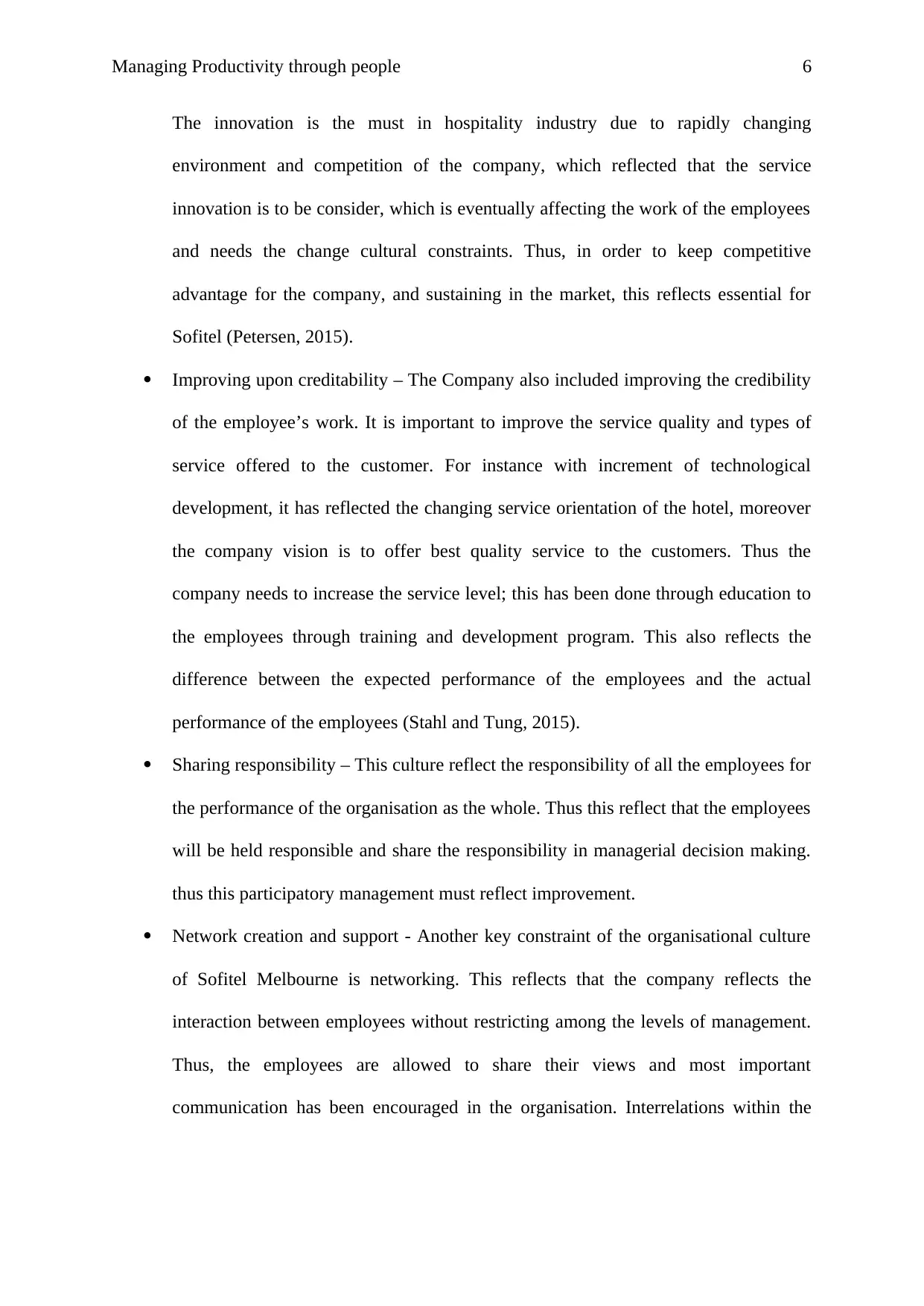
Managing Productivity through people 6
The innovation is the must in hospitality industry due to rapidly changing
environment and competition of the company, which reflected that the service
innovation is to be consider, which is eventually affecting the work of the employees
and needs the change cultural constraints. Thus, in order to keep competitive
advantage for the company, and sustaining in the market, this reflects essential for
Sofitel (Petersen, 2015).
Improving upon creditability – The Company also included improving the credibility
of the employee’s work. It is important to improve the service quality and types of
service offered to the customer. For instance with increment of technological
development, it has reflected the changing service orientation of the hotel, moreover
the company vision is to offer best quality service to the customers. Thus the
company needs to increase the service level; this has been done through education to
the employees through training and development program. This also reflects the
difference between the expected performance of the employees and the actual
performance of the employees (Stahl and Tung, 2015).
Sharing responsibility – This culture reflect the responsibility of all the employees for
the performance of the organisation as the whole. Thus this reflect that the employees
will be held responsible and share the responsibility in managerial decision making.
thus this participatory management must reflect improvement.
Network creation and support - Another key constraint of the organisational culture
of Sofitel Melbourne is networking. This reflects that the company reflects the
interaction between employees without restricting among the levels of management.
Thus, the employees are allowed to share their views and most important
communication has been encouraged in the organisation. Interrelations within the
The innovation is the must in hospitality industry due to rapidly changing
environment and competition of the company, which reflected that the service
innovation is to be consider, which is eventually affecting the work of the employees
and needs the change cultural constraints. Thus, in order to keep competitive
advantage for the company, and sustaining in the market, this reflects essential for
Sofitel (Petersen, 2015).
Improving upon creditability – The Company also included improving the credibility
of the employee’s work. It is important to improve the service quality and types of
service offered to the customer. For instance with increment of technological
development, it has reflected the changing service orientation of the hotel, moreover
the company vision is to offer best quality service to the customers. Thus the
company needs to increase the service level; this has been done through education to
the employees through training and development program. This also reflects the
difference between the expected performance of the employees and the actual
performance of the employees (Stahl and Tung, 2015).
Sharing responsibility – This culture reflect the responsibility of all the employees for
the performance of the organisation as the whole. Thus this reflect that the employees
will be held responsible and share the responsibility in managerial decision making.
thus this participatory management must reflect improvement.
Network creation and support - Another key constraint of the organisational culture
of Sofitel Melbourne is networking. This reflects that the company reflects the
interaction between employees without restricting among the levels of management.
Thus, the employees are allowed to share their views and most important
communication has been encouraged in the organisation. Interrelations within the
Paraphrase This Document
Need a fresh take? Get an instant paraphrase of this document with our AI Paraphraser
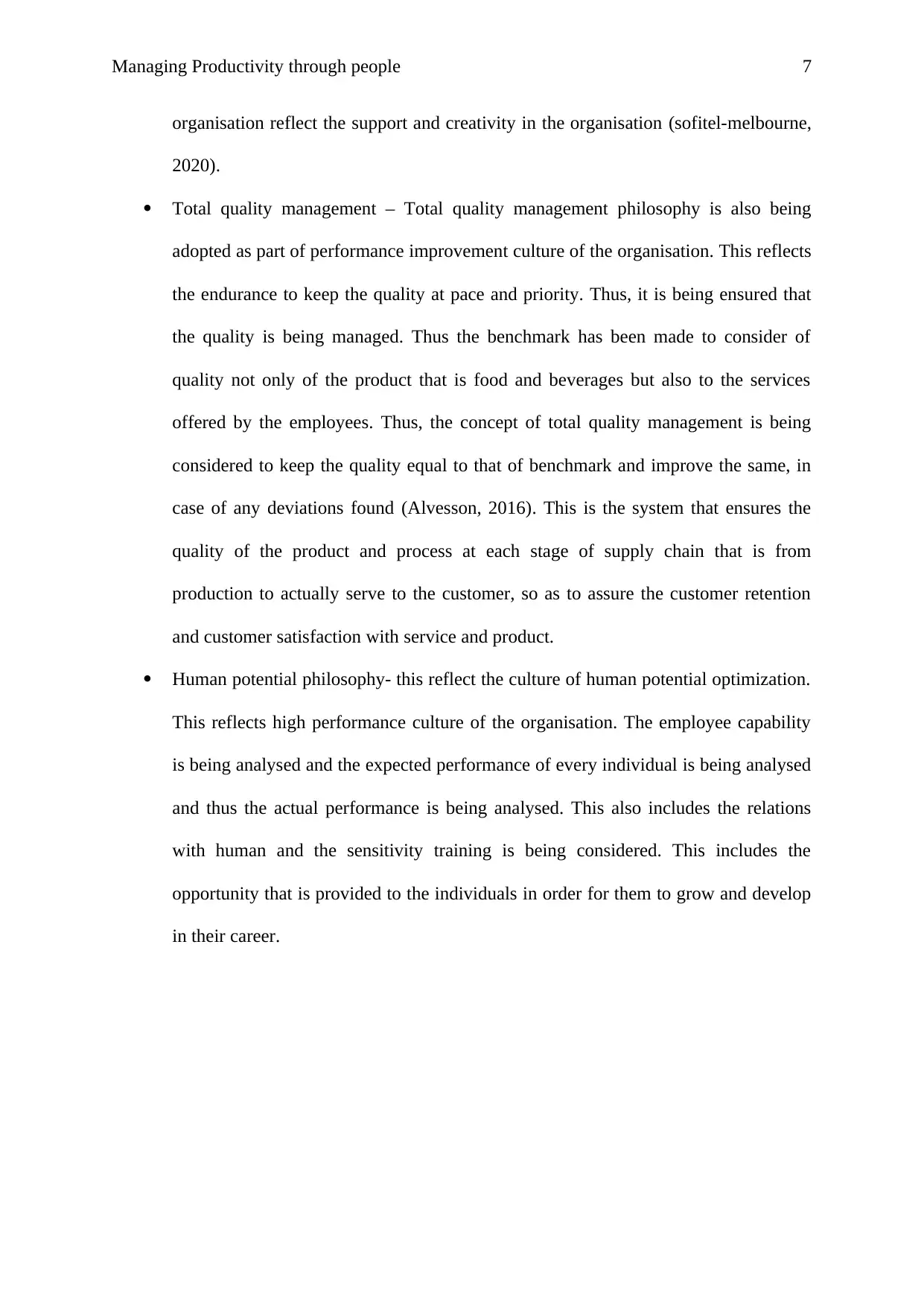
Managing Productivity through people 7
organisation reflect the support and creativity in the organisation (sofitel-melbourne,
2020).
Total quality management – Total quality management philosophy is also being
adopted as part of performance improvement culture of the organisation. This reflects
the endurance to keep the quality at pace and priority. Thus, it is being ensured that
the quality is being managed. Thus the benchmark has been made to consider of
quality not only of the product that is food and beverages but also to the services
offered by the employees. Thus, the concept of total quality management is being
considered to keep the quality equal to that of benchmark and improve the same, in
case of any deviations found (Alvesson, 2016). This is the system that ensures the
quality of the product and process at each stage of supply chain that is from
production to actually serve to the customer, so as to assure the customer retention
and customer satisfaction with service and product.
Human potential philosophy- this reflect the culture of human potential optimization.
This reflects high performance culture of the organisation. The employee capability
is being analysed and the expected performance of every individual is being analysed
and thus the actual performance is being analysed. This also includes the relations
with human and the sensitivity training is being considered. This includes the
opportunity that is provided to the individuals in order for them to grow and develop
in their career.
organisation reflect the support and creativity in the organisation (sofitel-melbourne,
2020).
Total quality management – Total quality management philosophy is also being
adopted as part of performance improvement culture of the organisation. This reflects
the endurance to keep the quality at pace and priority. Thus, it is being ensured that
the quality is being managed. Thus the benchmark has been made to consider of
quality not only of the product that is food and beverages but also to the services
offered by the employees. Thus, the concept of total quality management is being
considered to keep the quality equal to that of benchmark and improve the same, in
case of any deviations found (Alvesson, 2016). This is the system that ensures the
quality of the product and process at each stage of supply chain that is from
production to actually serve to the customer, so as to assure the customer retention
and customer satisfaction with service and product.
Human potential philosophy- this reflect the culture of human potential optimization.
This reflects high performance culture of the organisation. The employee capability
is being analysed and the expected performance of every individual is being analysed
and thus the actual performance is being analysed. This also includes the relations
with human and the sensitivity training is being considered. This includes the
opportunity that is provided to the individuals in order for them to grow and develop
in their career.
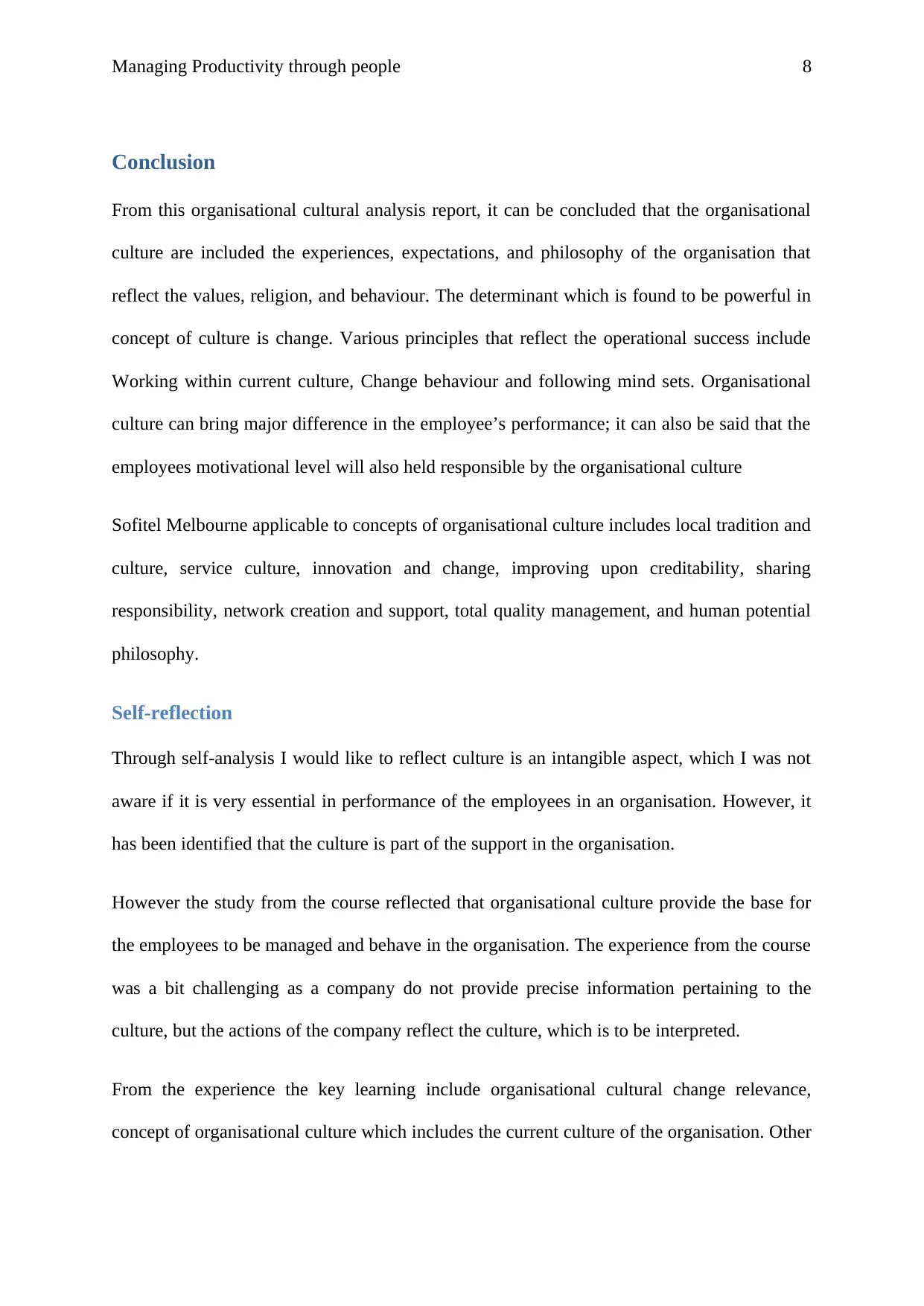
Managing Productivity through people 8
Conclusion
From this organisational cultural analysis report, it can be concluded that the organisational
culture are included the experiences, expectations, and philosophy of the organisation that
reflect the values, religion, and behaviour. The determinant which is found to be powerful in
concept of culture is change. Various principles that reflect the operational success include
Working within current culture, Change behaviour and following mind sets. Organisational
culture can bring major difference in the employee’s performance; it can also be said that the
employees motivational level will also held responsible by the organisational culture
Sofitel Melbourne applicable to concepts of organisational culture includes local tradition and
culture, service culture, innovation and change, improving upon creditability, sharing
responsibility, network creation and support, total quality management, and human potential
philosophy.
Self-reflection
Through self-analysis I would like to reflect culture is an intangible aspect, which I was not
aware if it is very essential in performance of the employees in an organisation. However, it
has been identified that the culture is part of the support in the organisation.
However the study from the course reflected that organisational culture provide the base for
the employees to be managed and behave in the organisation. The experience from the course
was a bit challenging as a company do not provide precise information pertaining to the
culture, but the actions of the company reflect the culture, which is to be interpreted.
From the experience the key learning include organisational cultural change relevance,
concept of organisational culture which includes the current culture of the organisation. Other
Conclusion
From this organisational cultural analysis report, it can be concluded that the organisational
culture are included the experiences, expectations, and philosophy of the organisation that
reflect the values, religion, and behaviour. The determinant which is found to be powerful in
concept of culture is change. Various principles that reflect the operational success include
Working within current culture, Change behaviour and following mind sets. Organisational
culture can bring major difference in the employee’s performance; it can also be said that the
employees motivational level will also held responsible by the organisational culture
Sofitel Melbourne applicable to concepts of organisational culture includes local tradition and
culture, service culture, innovation and change, improving upon creditability, sharing
responsibility, network creation and support, total quality management, and human potential
philosophy.
Self-reflection
Through self-analysis I would like to reflect culture is an intangible aspect, which I was not
aware if it is very essential in performance of the employees in an organisation. However, it
has been identified that the culture is part of the support in the organisation.
However the study from the course reflected that organisational culture provide the base for
the employees to be managed and behave in the organisation. The experience from the course
was a bit challenging as a company do not provide precise information pertaining to the
culture, but the actions of the company reflect the culture, which is to be interpreted.
From the experience the key learning include organisational cultural change relevance,
concept of organisational culture which includes the current culture of the organisation. Other
⊘ This is a preview!⊘
Do you want full access?
Subscribe today to unlock all pages.

Trusted by 1+ million students worldwide
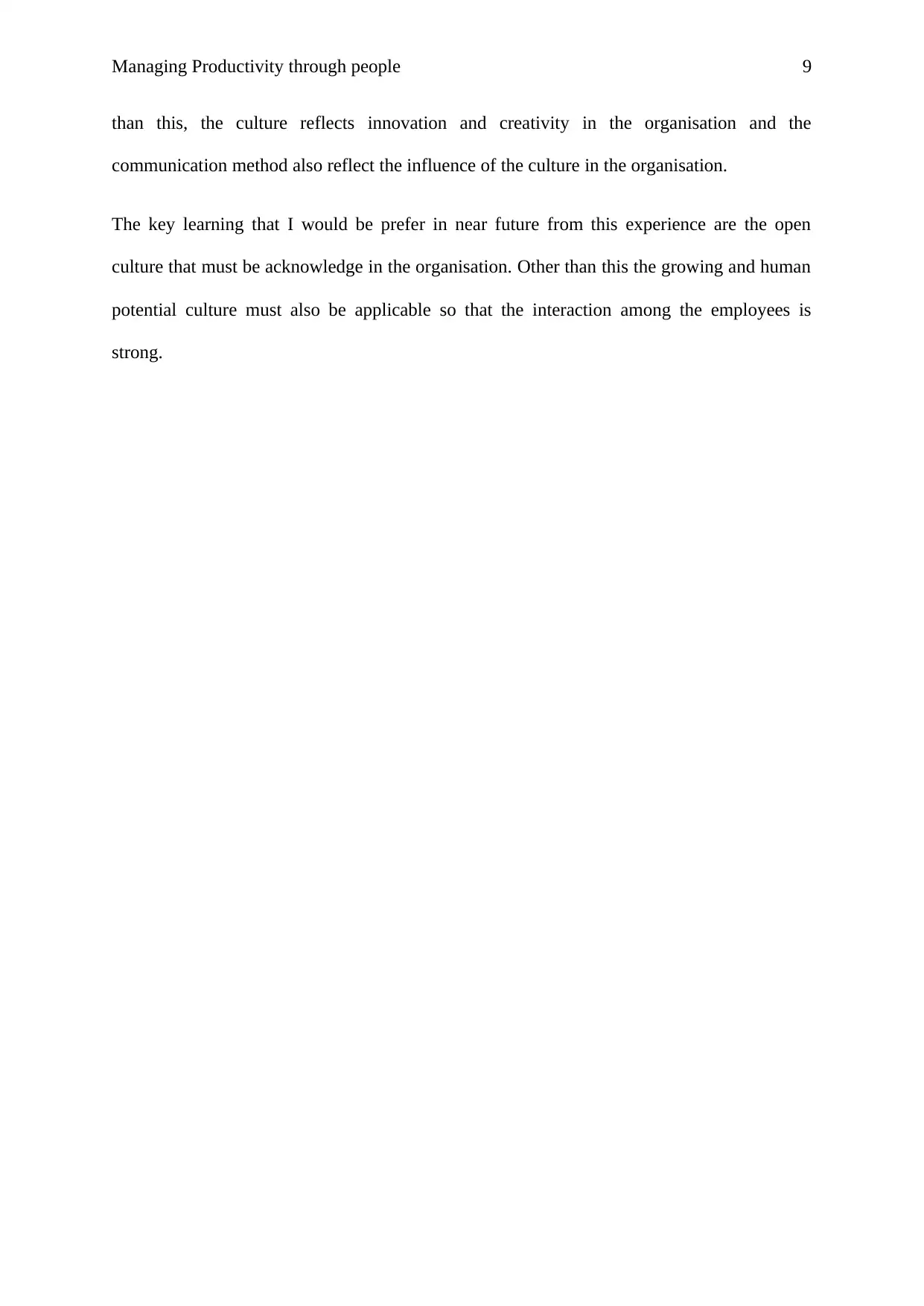
Managing Productivity through people 9
than this, the culture reflects innovation and creativity in the organisation and the
communication method also reflect the influence of the culture in the organisation.
The key learning that I would be prefer in near future from this experience are the open
culture that must be acknowledge in the organisation. Other than this the growing and human
potential culture must also be applicable so that the interaction among the employees is
strong.
than this, the culture reflects innovation and creativity in the organisation and the
communication method also reflect the influence of the culture in the organisation.
The key learning that I would be prefer in near future from this experience are the open
culture that must be acknowledge in the organisation. Other than this the growing and human
potential culture must also be applicable so that the interaction among the employees is
strong.
Paraphrase This Document
Need a fresh take? Get an instant paraphrase of this document with our AI Paraphraser
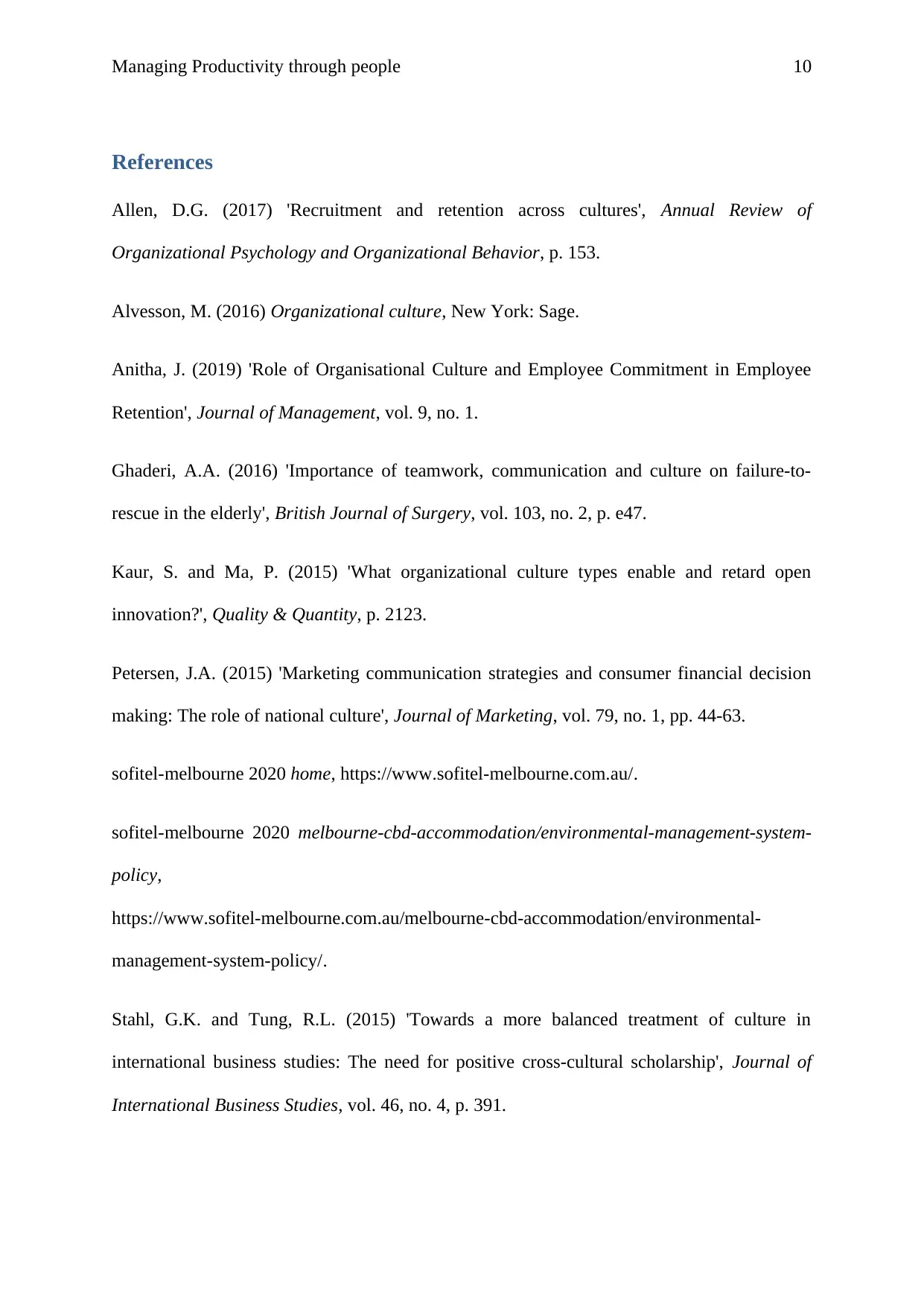
Managing Productivity through people 10
References
Allen, D.G. (2017) 'Recruitment and retention across cultures', Annual Review of
Organizational Psychology and Organizational Behavior, p. 153.
Alvesson, M. (2016) Organizational culture, New York: Sage.
Anitha, J. (2019) 'Role of Organisational Culture and Employee Commitment in Employee
Retention', Journal of Management, vol. 9, no. 1.
Ghaderi, A.A. (2016) 'Importance of teamwork, communication and culture on failure‐to‐
rescue in the elderly', British Journal of Surgery, vol. 103, no. 2, p. e47.
Kaur, S. and Ma, P. (2015) 'What organizational culture types enable and retard open
innovation?', Quality & Quantity, p. 2123.
Petersen, J.A. (2015) 'Marketing communication strategies and consumer financial decision
making: The role of national culture', Journal of Marketing, vol. 79, no. 1, pp. 44-63.
sofitel-melbourne 2020 home, https://www.sofitel-melbourne.com.au/.
sofitel-melbourne 2020 melbourne-cbd-accommodation/environmental-management-system-
policy,
https://www.sofitel-melbourne.com.au/melbourne-cbd-accommodation/environmental-
management-system-policy/.
Stahl, G.K. and Tung, R.L. (2015) 'Towards a more balanced treatment of culture in
international business studies: The need for positive cross-cultural scholarship', Journal of
International Business Studies, vol. 46, no. 4, p. 391.
References
Allen, D.G. (2017) 'Recruitment and retention across cultures', Annual Review of
Organizational Psychology and Organizational Behavior, p. 153.
Alvesson, M. (2016) Organizational culture, New York: Sage.
Anitha, J. (2019) 'Role of Organisational Culture and Employee Commitment in Employee
Retention', Journal of Management, vol. 9, no. 1.
Ghaderi, A.A. (2016) 'Importance of teamwork, communication and culture on failure‐to‐
rescue in the elderly', British Journal of Surgery, vol. 103, no. 2, p. e47.
Kaur, S. and Ma, P. (2015) 'What organizational culture types enable and retard open
innovation?', Quality & Quantity, p. 2123.
Petersen, J.A. (2015) 'Marketing communication strategies and consumer financial decision
making: The role of national culture', Journal of Marketing, vol. 79, no. 1, pp. 44-63.
sofitel-melbourne 2020 home, https://www.sofitel-melbourne.com.au/.
sofitel-melbourne 2020 melbourne-cbd-accommodation/environmental-management-system-
policy,
https://www.sofitel-melbourne.com.au/melbourne-cbd-accommodation/environmental-
management-system-policy/.
Stahl, G.K. and Tung, R.L. (2015) 'Towards a more balanced treatment of culture in
international business studies: The need for positive cross-cultural scholarship', Journal of
International Business Studies, vol. 46, no. 4, p. 391.
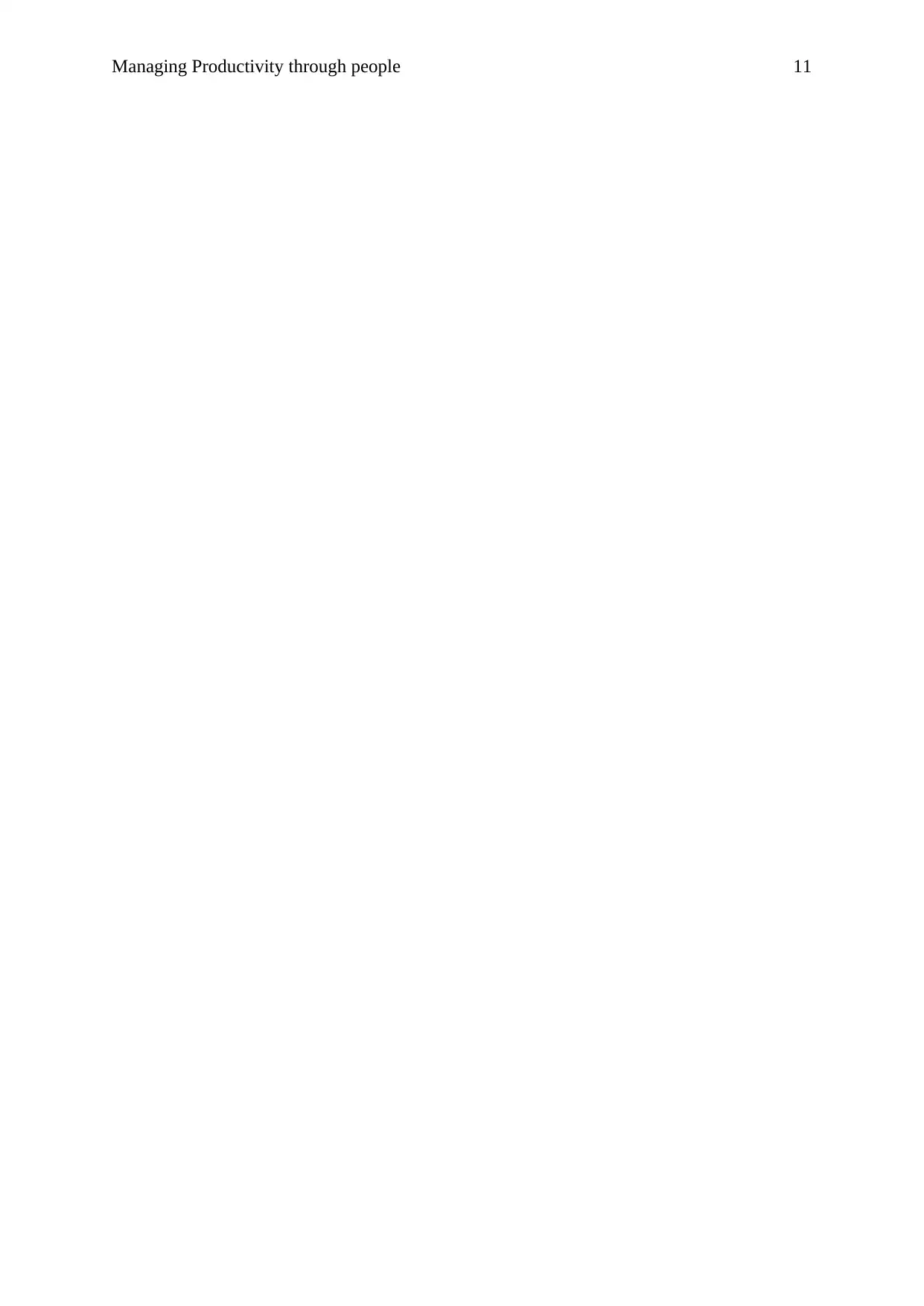
Managing Productivity through people 11
⊘ This is a preview!⊘
Do you want full access?
Subscribe today to unlock all pages.

Trusted by 1+ million students worldwide
1 out of 12
Related Documents
Your All-in-One AI-Powered Toolkit for Academic Success.
+13062052269
info@desklib.com
Available 24*7 on WhatsApp / Email
![[object Object]](/_next/static/media/star-bottom.7253800d.svg)
Unlock your academic potential
Copyright © 2020–2025 A2Z Services. All Rights Reserved. Developed and managed by ZUCOL.





